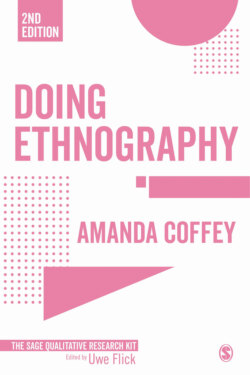Читать книгу Doing Ethnography - Amanda Coffey - Страница 12
На сайте Литреса книга снята с продажи.
What is ethnography?
ОглавлениеEthnography is a term used within the social sciences and humanities to describe and define a social research method, or more accurately a set of methods for understanding and making sense of cultural and social worlds. In literal translation ethnography means the writing (‘graphy’) of people (‘ethno’). Ethnography encompasses a range of data collection techniques for gathering qualitative information about a setting, and usually incorporates some kind of researcher participation within the daily life of the setting. Data collection in ethnographic research actually draws on many of the skills and methods social actors routinely use to navigate their own daily lives – for example, using techniques such as observation, listening, asking questions, gathering documents and recording information. In ethnography such routine and everyday practices are used, in systematic and reflective ways, in order to generate analyses and understanding.
Ethnographic methods are part of a broad umbrella of qualitative research approaches for documenting and understanding social and cultural life. Indeed, the terms ‘ethnography’ and ‘qualitative research’ are often used interchangeably. Moreover, ethnography is often viewed as a foundation stone of contemporary, and increasingly varied, qualitative research practices. Qualitative research in general, encompassing and drawing on ethnographic methods, has become increasingly utilized across many areas of social science, humanities and cognate fields including social anthropology, sociology, criminology, religious studies, health studies and education.
Ethnography is, then, a term used to describe a set of methods for collecting qualitative information, in order to develop and inform our understandings of everyday lives and cultures. Ethnography is also a term that is used to describe the product of, or outcome from, ethnographic research. The production or writing of ethnography is a craft skill, enabling the researcher (as author) to draw together both diverse materials and interpretation in ways that tell of a place and people. ‘Ethnographies’ in this sense of the term, are crafted reports of research, utilizing qualitative data and analysis in order to provide rich descriptions of the social setting being studied. Such reportage is usually in the form of a written text, which provides narration, but can also include other kinds of data display – photographs, moving images, poetry, documents, performance pieces and artefacts – in order to ‘write’ of and re-present the setting.
